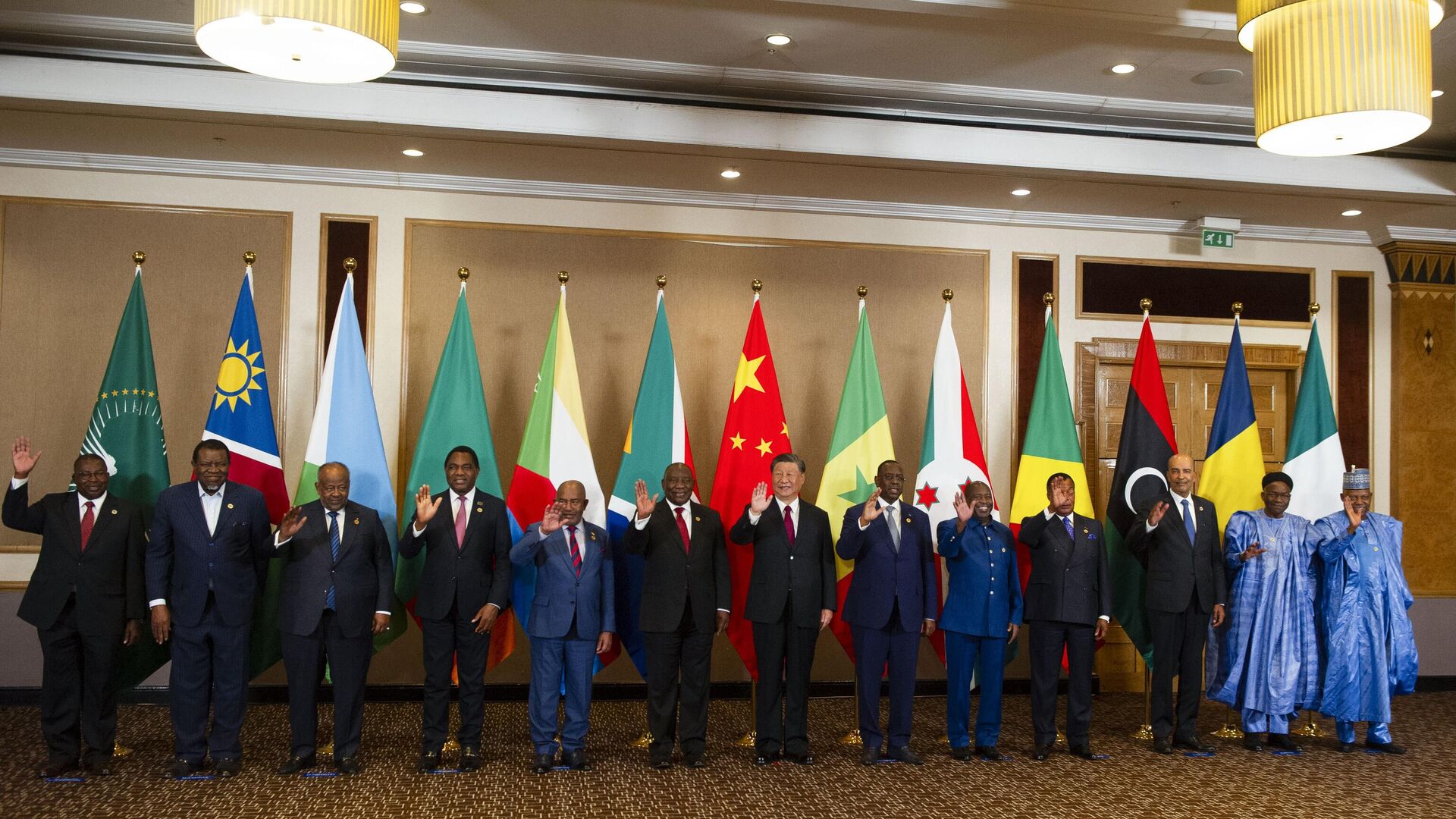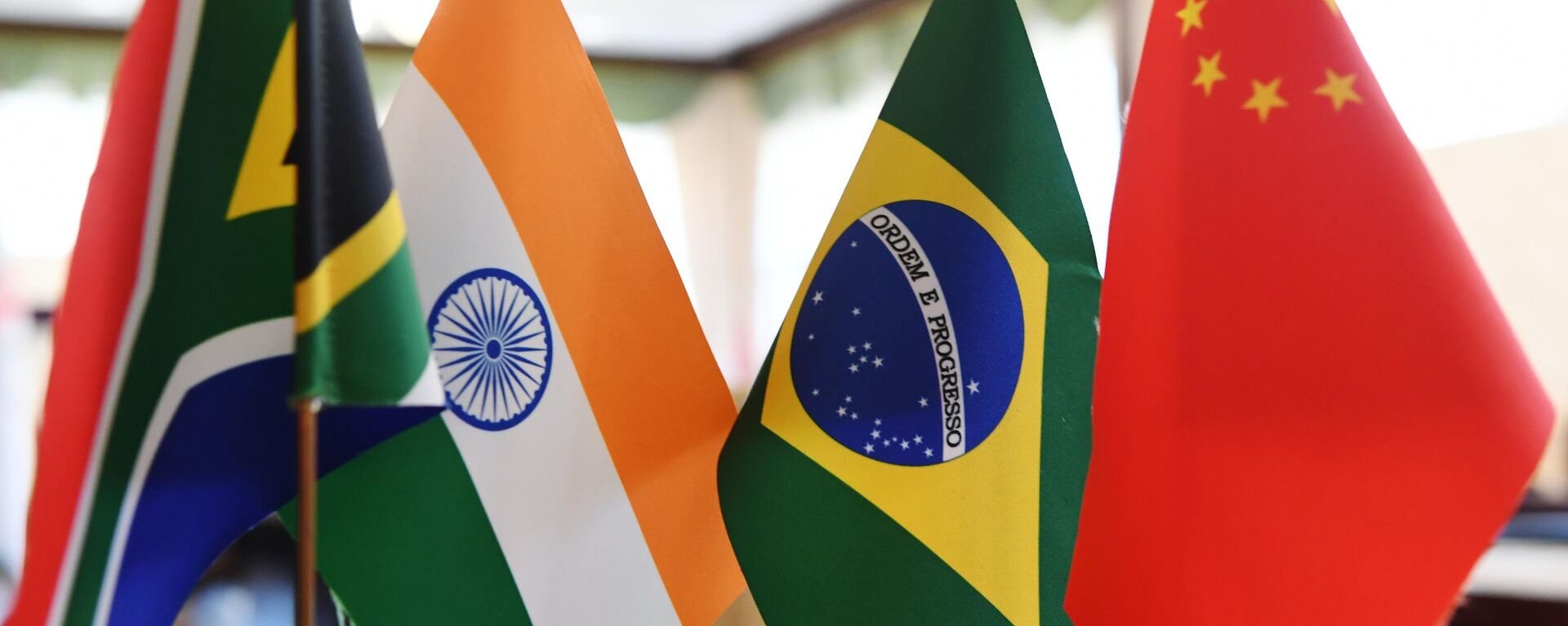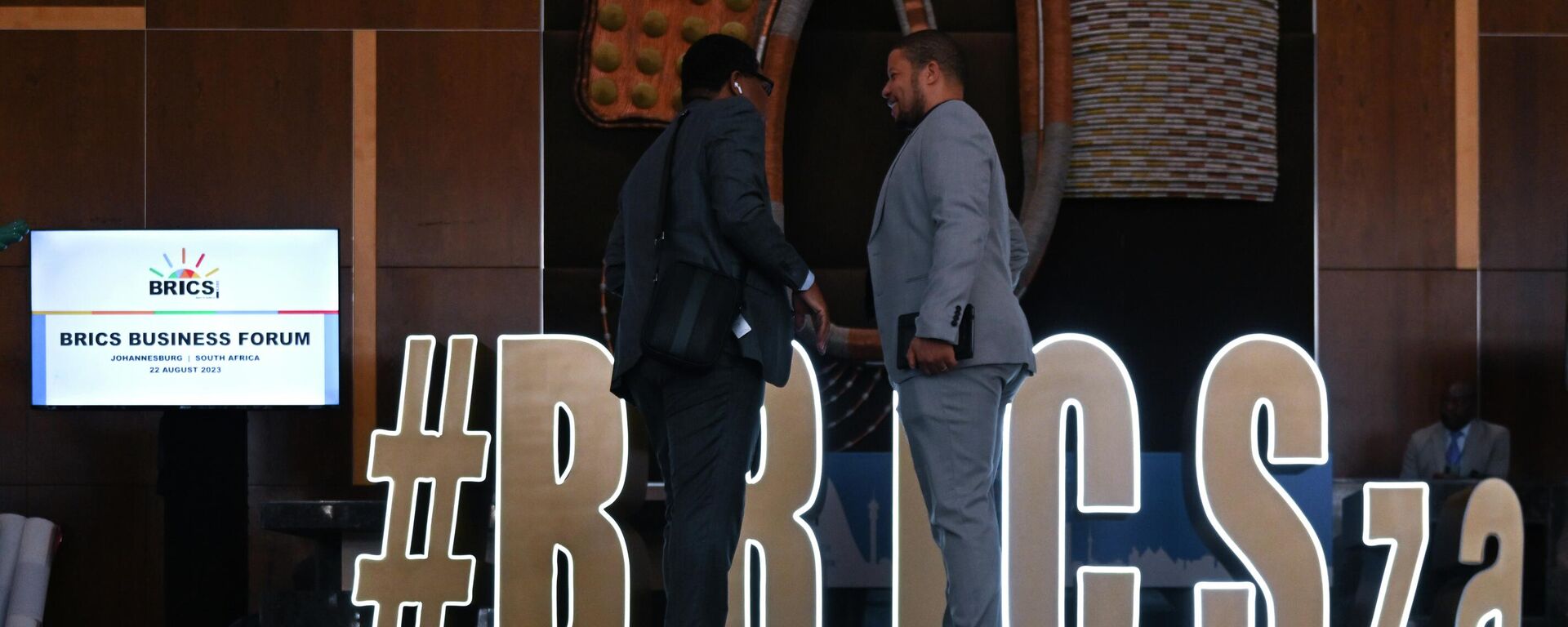https://en.sputniknews.africa/20240124/a-much-clearer-development-perspective-why-should-nigeria-join-brics-1064760864.html
'A Much Clearer Development Perspective': Why Should Nigeria Join BRICS?
'A Much Clearer Development Perspective': Why Should Nigeria Join BRICS?
Sputnik Africa
Recently, Nigerian Foreign Minister Yusuf Tuggar expressed the country's eagerness to join the BRICS alliance, sparking discussion about the potential benefits... 24.01.2024, Sputnik Africa
2024-01-24T14:30+0100
2024-01-24T14:30+0100
2024-01-24T14:30+0100
nigeria
united nations (un)
opinion
united states (us)
west
brics
united nations security council (unsc)
west africa
economic community of west african states (ecowas)
politics
https://cdn1.img.sputniknews.africa/img/07e7/09/06/1061921142_0:159:3077:1890_1920x0_80_0_0_fde1d19ce3ec2d121b01794a700c4ab5.jpg
Nigeria's presence in BRICS has a symbolic significance, Dr. Is'haq Modibbo Kawu, a prominent Nigerian broadcaster, journalist, and political scientist, said in an interview with Sputnik Africa, citing the West African country's position as Africa's most populous country.Earlier, Minister of Foreign Affairs Yusuf Tuggar told the Western media that Nigeria will strive to join BRICS within the next two years to ensure that the nation's voice is taken into account in major global organizations.According to Dr. Kawu, a former director-general of Nigeria's National Broadcasting Commission, Nigeria's inclusion in BRICS would enhance the importance of the institution and contribute to the ongoing shift towards a new multipolar world order.Underscoring the potential for mutual benefit, he highlighted the role that BRICS could play in accelerating Nigeria's economic development, which is critical to meeting the needs of its rapidly growing population.Furthermore, Dr. Kawu underscored the historical imposition of doctrines by the Bretton Woods Institutions that perpetuated unequal exchange and underdevelopment in post-colonial states.Regarding Nigeria's potential contributions as a partner to other BRICS members, Dr. Kawu pointed to the country's burgeoning manufacturing, financial, services, technology, and entertainment sectors.The political expert also suggested that Nigeria's participation in BRICS could position the country as a gateway to West Africa, driving regional economic growth and facilitating a transition away from historical colonial influences to greater regional integration.Speaking about the potential impact of the African economic giant's inclusion in the BRICS group on the country's political influence in the international arena, Dr. Kawu emphasized Nigeria's historical recognition as a key player in global affairs.He underscored the potential for Nigeria to strengthen its global partnerships and increase its diplomatic influence through participation in the BRICS alliance.On the need to reform the UN Security Council, Dr. Kawu aligned with the call for democratization and expansion of the Council's membership to reflect the contemporary global landscape.He articulated Nigeria's longstanding campaign for broader representation and its desire to secure a permanent seat on the UNSC.Moreover, Dr. Kawu highlighted Nigeria's historic commitment to advocating for a new international economic order aimed at eradicating underdevelopment in Africa, Asia, and Latin America.Finally, Dr. Kawu underscored the potential for Nigeria, if granted a permanent seat on the UNSC, to actively pursue initiatives consistent with this vision at the international and regional levels, including security challenges, especially terrorism and other issues related to foreign interference, economic policies, democratic governance and social justice.At the 2023 BRICS summit in Johannesburg, Argentina, Egypt, Ethiopia, Iran, Saudi Arabi and the United Arab Emirates were invited to join the bloc. Their full membership took effect on January 1, 2024, with the exception of Argentina, which abandoned its plans to join the group under the new president Javier Milei.
https://en.sputniknews.africa/20240105/brics-expansion-historic-beginning-of-new-era-in-international-relations-madagascan-newspaper-1064482142.html
https://en.sputniknews.africa/20240105/brics-seeking-global-economic-system-without-western-domination-expert-says-1064478887.html
nigeria
united states (us)
west
west africa
Sputnik Africa
feedback@sputniknews.com
+74956456601
MIA „Rossiya Segodnya“
2024
Muhammad Nooh Osman
https://cdn1.img.sputniknews.africa/img/07e7/04/0a/1058467512_0:0:1280:1280_100x100_80_0_0_ec723833bcbfcaed2e21952965ad99e4.jpg
Muhammad Nooh Osman
https://cdn1.img.sputniknews.africa/img/07e7/04/0a/1058467512_0:0:1280:1280_100x100_80_0_0_ec723833bcbfcaed2e21952965ad99e4.jpg
News
en_EN
Sputnik Africa
feedback@sputniknews.com
+74956456601
MIA „Rossiya Segodnya“
Sputnik Africa
feedback@sputniknews.com
+74956456601
MIA „Rossiya Segodnya“
Muhammad Nooh Osman
https://cdn1.img.sputniknews.africa/img/07e7/04/0a/1058467512_0:0:1280:1280_100x100_80_0_0_ec723833bcbfcaed2e21952965ad99e4.jpg
nigeria, united nations (un), united states (us), west, brics, united nations security council (unsc), west africa, economic community of west african states (ecowas), politics, political views, brics expansion, neocolonialism
nigeria, united nations (un), united states (us), west, brics, united nations security council (unsc), west africa, economic community of west african states (ecowas), politics, political views, brics expansion, neocolonialism
'A Much Clearer Development Perspective': Why Should Nigeria Join BRICS?
Muhammad Nooh Osman
Writer/Editor
Recently, Nigerian Foreign Minister Yusuf Tuggar expressed the country's eagerness to join the BRICS alliance, sparking discussion about the potential benefits for Nigeria. He also said that Nigeria, Africa's largest economy and most populous nation, deserves a seat on the UN Security Council, underscoring the need to "democratize" the UN system.
Nigeria's presence in
BRICS has a symbolic significance,
Dr. Is'haq Modibbo Kawu, a prominent Nigerian broadcaster, journalist, and political scientist, said in an interview with
Sputnik Africa, citing the West African country's position as Africa's most populous country.
Earlier, Minister of Foreign Affairs Yusuf Tuggar told the Western media that Nigeria will strive to join BRICS within the next two years to ensure that the nation's voice is taken into account in major global organizations.
According to Dr. Kawu, a former director-general of Nigeria's National Broadcasting Commission,
Nigeria's inclusion in BRICS would enhance the importance of the institution and contribute to the ongoing shift towards a new multipolar world order.
Underscoring the potential for mutual benefit, he highlighted the role that BRICS could play in accelerating Nigeria's economic development, which is critical to meeting the needs of its rapidly growing population.
"The international order that has been in place, which the Western media describes as the 'rules-based order', is an order that has served the interests of the United States in the main, and it's satellites in the West European region," Kawu said. "BRICS has a much clearer perspective of development, which takes the interests of all sides into consideration."
Furthermore, Dr. Kawu underscored the historical imposition of doctrines by the Bretton Woods Institutions that perpetuated unequal exchange and underdevelopment in post-colonial states.
Regarding Nigeria's
potential contributions as a partner to other BRICS members, Dr. Kawu pointed to the country's burgeoning manufacturing, financial, services, technology, and entertainment sectors.
The political expert also suggested that Nigeria's participation in BRICS could position the country as a gateway to West Africa, driving regional economic growth and facilitating a transition away from historical colonial influences to greater regional integration.
"The truth of the region is that newer forces are showing a tendency of realization that the pivot should move away from the colonial subjugation that the French have long maintained to greater integration in the region," he said. "ECOWAS [Economic Community of West African States] was not going to be rapidly successful, for as long as French interest dominates in the region," he said.
Speaking about the potential impact of the African economic giant's inclusion in the BRICS group on the country's political influence in the international arena, Dr. Kawu emphasized Nigeria's historical recognition as a key player in global affairs.
He underscored the potential for Nigeria to strengthen its global partnerships and increase its diplomatic influence through participation in the BRICS alliance.
"Belonging to BRICS would assist Nigeria to deepen its ties with the new powers of the world, such as Russia and China; the South American Giant Brazil, as well as India, which has longstanding relationships with Nigeria," Dr. Kawu said. "Even the new entrants into BRICS like Iran and Saudi Arabia, or our brothers in Ethiopia, would certainly be happy to have Nigeria by their side in the organisation."
On the need to reform the UN Security Council, Dr. Kawu aligned with the call for democratization and expansion of the Council's membership to reflect the contemporary global landscape.
He articulated Nigeria's longstanding campaign for broader representation and its desire to secure a permanent seat on the UNSC.
"How can the international system function organically and in a just manner, without taking into cognizance, the realities of a multipolar world, with new forces that have entered the scene, in terms of economic development, population, military power and other potentials?" he questioned.
Moreover, Dr. Kawu highlighted Nigeria's historic commitment to advocating for a new international economic order aimed at eradicating underdevelopment in Africa, Asia, and Latin America.
Finally, Dr. Kawu underscored the
potential for Nigeria, if granted a permanent seat on the UNSC, to actively pursue initiatives consistent with this vision at the international and regional levels, including security challenges, especially terrorism and other issues related to foreign interference, economic policies, democratic governance and social justice.
At the 2023 BRICS summit in Johannesburg, Argentina, Egypt, Ethiopia, Iran, Saudi Arabi and the United Arab Emirates were invited to
join the bloc. Their full membership took effect on January 1, 2024, with the exception of Argentina, which abandoned its plans to join the group under the new president Javier Milei.




